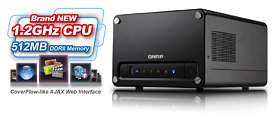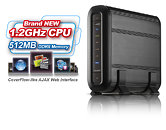Monday, March 23rd 2009

QNAP Launches the World's First 1-bay and 2-bay NAS with iSCSI
QNAP Systems, Inc. today announced the world's first one-bay and two-bay NAS with iSCSI TS-119 and TS-219 Turbo NAS for home, SOHO, and SMB users. The TS-119 and TS-219 are the next generation NAS models that combine a fashionable shiny black diamond design, outstanding system performance, rich features, and high stability. Powered by 1.2GHz CPU and 512MB DDRII RAM, the TS-119 and TS-219 support Internet Small Computer System Interface (iSCSI) target service (up to 8 iSCSI devices), Online RAID Capacity Expansion and Online RAID Level Migration (2-bay model only), automatic policy-based IP blocking, schedule power on and off, 2 IP cameras for network surveillance, UPnP/ DLNA media server, mail server, and high-speed BT/FTP/HTTP and eMule download, etc."The new generation TS-119 and TS-219 Turbo NAS are the most affordable NAS servers with iSCSI application for personal and business users. The built-in iSCSI target feature allows the users to create an IP-SAN (storage area network) for data backup or storage capacity expansion on the home or office network. The Turbo NAS is also ideal multimedia storage solution for home users," says Laurent Cheng, Product Manager from QNAP. "The built-in UPnP/ DLNA media server (TwonkyMedia) of the TS-119 and TS-219 supports numerous DLNA media players such as Sony PS3, Microsoft Xbox 360 gaming consoles and High-Definition media players (compatible with NFS). The users can even use their iPhone and iPod touch to play the music and video or view the photos on the NAS."
The TS-119 supports 2TB SATA hard drive and the total storage capacity can be expanded to maximum 4TB by eSATA of USB storage device expansion. The unique fanless design enables an absolutely quiet working environment. Its power consumption is less than 13W which is ideal for operation 24x7 at home or in the office. The TS-219 is a powerful NAS which supports two hot-swappable hard drives, up to 4TB storage capacity, RAID 1, Online RAID Capacity Expansion, and Online RAID Level Migration. The TS-119 and TS-219 come with Turbo NAS beta firmware 3.0 which brings the best user experience with CoverFlow-like AJAX web interface. For more information, please visit QNAP website. The product page for the TS119 can be found here, and that of the TS219 here.
The TS-119 supports 2TB SATA hard drive and the total storage capacity can be expanded to maximum 4TB by eSATA of USB storage device expansion. The unique fanless design enables an absolutely quiet working environment. Its power consumption is less than 13W which is ideal for operation 24x7 at home or in the office. The TS-219 is a powerful NAS which supports two hot-swappable hard drives, up to 4TB storage capacity, RAID 1, Online RAID Capacity Expansion, and Online RAID Level Migration. The TS-119 and TS-219 come with Turbo NAS beta firmware 3.0 which brings the best user experience with CoverFlow-like AJAX web interface. For more information, please visit QNAP website. The product page for the TS119 can be found here, and that of the TS219 here.


6 Comments on QNAP Launches the World's First 1-bay and 2-bay NAS with iSCSI
I've just built a dual Xeon server and it is less than 130W when running a typical FTP/NAS equivalent service. Yes, a lot more than 21W... but NO, nowhere near 350W. And guess what, if I need horsepower, I've got it on tap.
Apart from criticising their disingenuous statistics, the TS-219 looks nice. However, I would prefer they adopted an Atom or VIA based x86... which would allow much greater flexibility in install options. I'd trade 3W extra power for that flexibility.
PS. iSCSI is something completely different... it's a silly name easily confused with hardware SCSI interface. But it's a internet protocol.